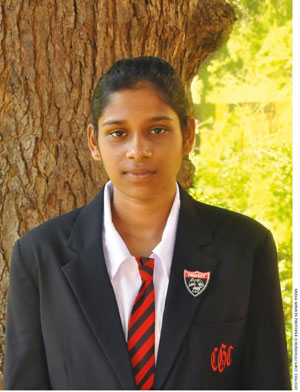YOUTH FORUM
CLOSE THE INEQUALITY GAP
Roxshana Ravichandran perceives a chasm between the haves and have-nots
Q: What are the challenges facing our country today?
A: With Sri Lanka’s diversity comes its own set of challenges and obstacles – including racism, violence and fundamentalism, as well as economic and cultural degradation due to eroding standards and values.
Today, it has become more difficult for youth not only to set goals for themselves but also accomplish the tasks assigned to them. Although graduation rates are high, job opportunities are on the decline and unemployment is increasing. Drug addiction and gang wars too are on the rise.
Q: So where do you see Sri Lanka in 10 years’ time?
A: My dream is to see a cleaner country with biodegradable waste and recycling being the focus, and a greener nation thatis fully cultivated. This will fuel a thriving ecosystem and boost the economy through tourism opportunities. I also wish for a more stable economy with citizens’ basic rights being addressed and met.
Q: And do you believe that Sri Lanka will be united one day?
A: The term ‘united’ refers to a lack of conflict; but for the oppressed, it means putting one’s country before self and making it better for the future. Even after almost three decades of civil war, we do not stand united and nor do we help each other, which is mainly due to our political leadership.
Our nation will be united only when we act wisely at the polls. Despite the wishes of the citizenry to unite the country, the political leaders are not for it – therefore, we must entrust our country to those who genuinely believe in unity and equality.
Q: What challenges do you observe in the spheres of education and women’s empowerment?
A: In education, the government should drive reforms – starting with quality education in preschools; introducing life skills such as finance, accountancy, budgeting, relationship building, good manners and social skills into the curriculum; and teaching more about the balance between social media, technology and nature.
I would also like to see more progress in women’s empowerment with positive steps being taken to encourage women in commerce, politics, media and sports; creating greater awareness among women about their rights and responsibilities; and ensuring equal rights across various platforms.
Q: And what are your expectations of the world and its people?
A: I expect the world to be united with more countries avoiding conflict and living in harmony. The pen should be the most powerful weapon instead of the bullet and people must not be victimised by racism.
There should be no discrimination of any form and children must grow up in a peaceful environment rather than one filled with terrifying violence. I don’t want the ecosystems of the world to be destroyed or any species to become extinct due to human activity.
Q: How do you view the growing importance of social media today?
A: It plays a key role in our lives today with information accessible at our fingertips. It’s a tool that helps grow both business and society, and creates greater awareness of social causes. While social media is truly embedded in our lives, it also comes with pressures for young people to adopt lifestyles and dynamics that are not ideal for them.
Q: What’s the good, the bad and the ugly here in Sri Lanka?
A: The ‘good’ is that we have free education and healthcare, are open to dialogue, are blessed with good weather, media freedom and voting rights.
However, the gap between the rich and poor is growing, with the wealthy and politicians more interested in individual wellbeing rather than the welfare of our nation. Although Sri Lanka gained independence from the British, it’s yet to be free of racism, greed, crime, corruption, social issues, cruelty and abuse, terrorism, female infanticide, gender inequality, ‘dowry deaths,’ gang rapes and illegal activities.
Q: What challenges do young people face in the global context?
A: Young people are the most vulnerable segment of society because they have to face life on their own, struggling for their future due to inadequate job opportunities and a university system that doesn’t enable them to study what they want or gain entrance even with relevant qualifications. Studying abroad isn’t affordable for everyone.
Drug and substance abuse too is rampant, and youth also have to deal with the pressures of materialism and conformance as dictated by social media.







An insightful interview.
This is a great article! My compliments on your impressive interview.